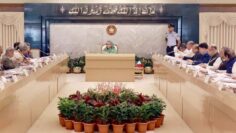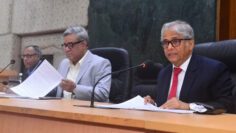A budget to fight the global economic crisis
Efforts will be made to increase domestic investment and bridle the rising inflation that has reached its highest level in a year and a half. The budget is also likely to include measures to ensure the implementation of the government’s incentive to cushion the after-effects of the pandemic and raise food production, export growth, and job growth.
It is believed, from the expenditure in previous years, that the finance minister is likely to present a budget of Tk 6.78 trillion, 15.40 percent of national GDP. It will be a 12.29 percent, or Tk 741.83 billion, increase over the budget for the current fiscal.
GDP GROWTH AND INFLATION
On Tuesday, two days ahead of the budget being brought to parliament, the World Bank lowered its world economic growth forecast to 2.9 percent.
Despite this global economic crisis, Bangladesh’s GDP growth target has been set at 7.5 percent, higher than the 7.2 percent target for the ongoing year. According to the World Bank, the growth rate for Bangladesh could be 6.7 percent.
If the target is achieved, the total GDP will surpass the milestone of $500 billion and stand at $512 billion at the end of the new fiscal year.
The investment target has been set at 31.5 percent of GDP, including 24.90 percent from the private sector and 6.6 percent from the government sector.
In addition to a lower corporate tax rate to encourage investment, the budget may also include several proposals to bolster GDP growth.
Zahid Hussain, a former lead economist of the World Bank’s Dhaka office, suggested the government design an employment-friendly budget by keeping inflation in check and ensuring food security amid increasing import spending triggered by the rise in international commodities prices. The main cause of this inflation is the war in Ukraine.
This could include an allocation of Tk 150 billion to push incentives in the agriculture sector. Currently, the agriculture sector is allocated Tk 120 billion in subsidies, which are provided to the farmers for buying fertilisers, farming equipment, high-quality seeds, and to pay for electricity.
The government is targeting an inflation ceiling of 5.5 percent in the next fiscal. The figure was 5.3 percent in the present fiscal but was revised to 5.8 percent in the second half of the year as the war hiked the price of fuel and other commodities in the global market.
According to the Bangladesh Bureau of Statistics (BBS), inflation rose to 6.29 percent in April, the highest in the last year and a half.
“Currently, the biggest challenge for the national economy is inflation and the lack of balance between demand and supply in the foreign currency market,” said Zahid Hussain.



















